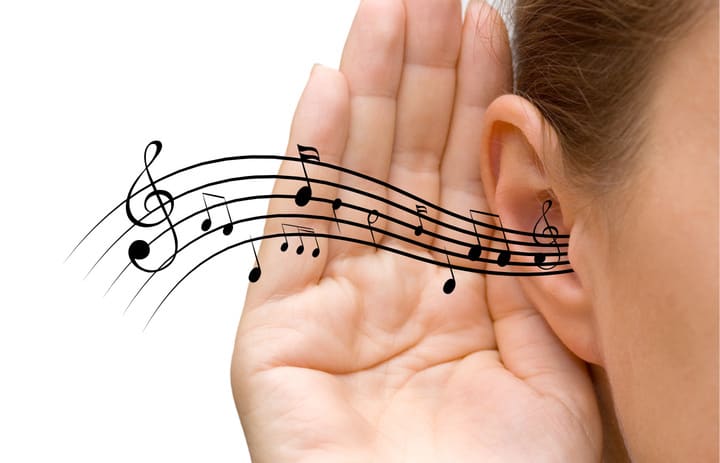Why Ear Training is Essential for Musicians and How to Improve It
Discover why ear training is the hidden key to becoming a confident, expressive, and intuitive musician. From pitch perfection to fearless improvisation, this blog breaks down the real reasons ear training matters - and gives you practical, pro-backed tips to sharpen your listening skills. Whether you’re a curious beginner or a seasoned performer, your ears are your greatest asset. Ready to train them? Dive in and start hearing music like never before. ✨
SKILL DEVELOPMENTMUSIC EDUCATIONLEARNING STRATEGIESMUSIC PRACTICE
Why Ear Training is Essential for Musicians and How to Improve It
As musicians, we spend countless hours honing our technical skills - practicing scales, mastering repertoire, and drilling theory. But one area that's often overlooked, despite being just as vital, is ear training. Whether you're a beginner or a seasoned performer, ear training is the invisible thread that connects everything in music. It sharpens your intuition, elevates your expression, and makes you a more versatile, confident musician. Let’s unpack why ear training is a non-negotiable skill - and how you can actively improve it, one day at a time.


🎧 What is Ear Training?
In simple terms, ear training is the practice of learning to recognise and understand musical sounds without relying on notation or visual cues. This includes identifying intervals, chord qualities, scales, rhythms, and even subtle changes in pitch or articulation.
"When you train your ear, you're essentially rewiring your brain to recognise musical patterns more efficiently," says Dr. Heather Yonce, a renowned professor of music theory. "It’s the difference between speaking a language and understanding its grammar versus merely reading a dictionary."
Ear training helps you internalise music deeply - turning theory into instinct and transforming performance into real-time musical conversation.
🎯 Why is Ear Training Essential?
1. Improved Sight-Reading 📖
One of the lesser-known benefits of ear training is how much it helps with sight-reading. If you can "hear" what’s on the page before you play it, you’ll naturally read more fluently.
“When I sight-read, my ears are already a beat ahead of my fingers. That anticipation comes from years of interval training. I can guess what comes next - not because I'm psychic, but because I know the sound of a perfect fourth or a minor sixth,” says Rachel L., a session pianist for film scores.
2. Better Intonation and Pitch Accuracy 🎤
For vocalists and players of fretless or wind instruments, ear training is the key to consistent intonation. It helps you hear micro-adjustments in pitch and correct them instantly.
“Good pitch isn’t about having a ‘gifted ear’ - it’s about training. Violinists, for instance, rely on muscle memory and ear feedback to stay in tune. You don’t get that precision without ear work,” says conductor and educator Martin Chu.
3. Enhanced Improvisation
Improvisation might seem like a mysterious talent, but it’s deeply connected to a trained ear. If you can hear the chord changes and feel the scale options, you can respond musically in real time. Jazz musicians, in particular, spend years learning to “hear ahead” in a tune.
“You can’t improvise what you can’t hear. The greats - Miles Davis, John Coltrane - they trained their ears ruthlessly. It wasn’t just soul. It was skill,” notes Berklee College of Music instructor Miguel Arana.
4. Deeper Musical Understanding
Ear training allows you to move past the surface of a piece and connect with its inner logic. You’re not just reading chords - you understand them. You’re not just playing a melody - you feel how it wants to resolve.
“Theory makes sense when you can hear it. Otherwise, it’s just a set of rules. Ear training gives life to theory,” says Dr. Elaine Moore, music cognition researcher.
5. Stronger Musical Memory
Ever wished you could memorise pieces faster? That’s ear training at work. The more refined your ear, the quicker you can remember harmonic patterns, motifs, and phrasing. In fact, professional musicians often memorise not by finger patterns alone, but by aural landmarks in a piece - predictable shifts, cadence points, or recurring melodic shapes.
6. Improved Ensemble Communication
If you’ve ever played in a band, orchestra, or choir, you know how crucial it is to listen to others. Ear training sharpens that awareness - allowing you to blend, match pitch, and respond to dynamics instantly.
“You know someone has a trained ear when they don’t need to be told to adjust - they just hear the mix and react. That’s what makes a great ensemble player,” says Prakash Iyer, Indian fusion artist and ensemble coach.
🚀 How to Improve Your Ear Training
1. Start with Intervals
Intervals are the building blocks of melody and harmony. Start by learning to recognise major/minor seconds, thirds, fifths, etc. Associate them with familiar songs ("Here Comes the Bride" = perfect fourth, for instance). Apps like Tenuto and Toned Ear are great for this.
2. Move On to Chords
Begin with major and minor triads, then expand to diminished, augmented, and seventh chords. Practice both identifying them by ear and singing the individual notes within each chord.
“The goal is to hear a chord and feel what it’s doing emotionally. That starts by recognising its quality and context,” says LA-based composer Nina Patel.
3. Transcribe Songs by Ear
Transcribing music without sheet music is one of the most effective ways to train your ear. Start with simple melodies, then work your way up to more complex lines. You’re not just identifying notes - you’re learning phrasing, timing, and feel.
4. Develop Rhythmic Awareness
Clap or tap out rhythms from songs you hear. Practice with a metronome or rhythm trainer. Learn to recognise time signatures and subdivisions.
“Ear training isn’t just pitch. Rhythm is a huge part. A solid groove comes from hearing time clearly, not just counting it,” says percussionist Deepak Menon.
5. Use Apps or Online Platforms
Apps like EarMaster, Teoria, or SoundGym offer customisable drills and feedback. These platforms gamify learning, making ear training consistent and engaging.
6. Sing - Even if You’re Not a Singer
Singing scales, arpeggios, or even the parts you play on your instrument helps internalise sound. It forces your brain to connect pitch with breath and body - supercharging your memory and recognition.
7. Practice in Context
Don't isolate ear training - integrate it with your daily playing. Try figuring out your favourite song by ear. Harmonise a melody on the spot. Test yourself in live music settings.
8. Get Feedback
Working with a teacher or coach can fast-track your progress. They’ll catch habits you miss and tailor exercises to your current level.
🎬 Final Thoughts
Ear training is not a side skill - it’s at the very heart of musical fluency. It helps you decode music faster, connect more deeply with it, and perform with greater confidence and freedom. And here's the best part: anyone can improve their ear. It’s not a mysterious gift. It’s a skill. Like learning a new language, it starts slowly - but with consistent practice, it becomes second nature. So, plug in your headphones, open your favourite app, or sit down at your instrument. Your ears are your most powerful musical tool - start training them today.
Share this on:
About The Author


Padmavathy Divakaran is a distinguished pianist, arranger, and music educator, currently serving as the Director of Aum Piano Studio. Formerly the representative for MTB Exams in Tamil Nadu and Karnataka - a globally recognised music education board based in the UK - she has consistently championed excellence in music education. Padmavathy holds a BA (Honours) in Music from Middlesex University, London, and a Diploma in Higher Education – Music from KM College of Music and Technology, Chennai. Her outstanding talent has been recognised through multiple scholarships and awards, including those presented by Dr. A.R. Rahman. As a performer, she has showcased her versatility across classical and contemporary genres, playing with orchestras in both London and Chennai. She was a core member of the Roliwood Seaboard Ensemble, playing a key role in the global launch of the ROLI Seaboard. Her artistry has earned her the honour of performing at prestigious events, including a special performance for Prince William, Simon Cowell, and other notable personalities at The Founders Forum in the UK - a testament to her global reach and artistic impact.